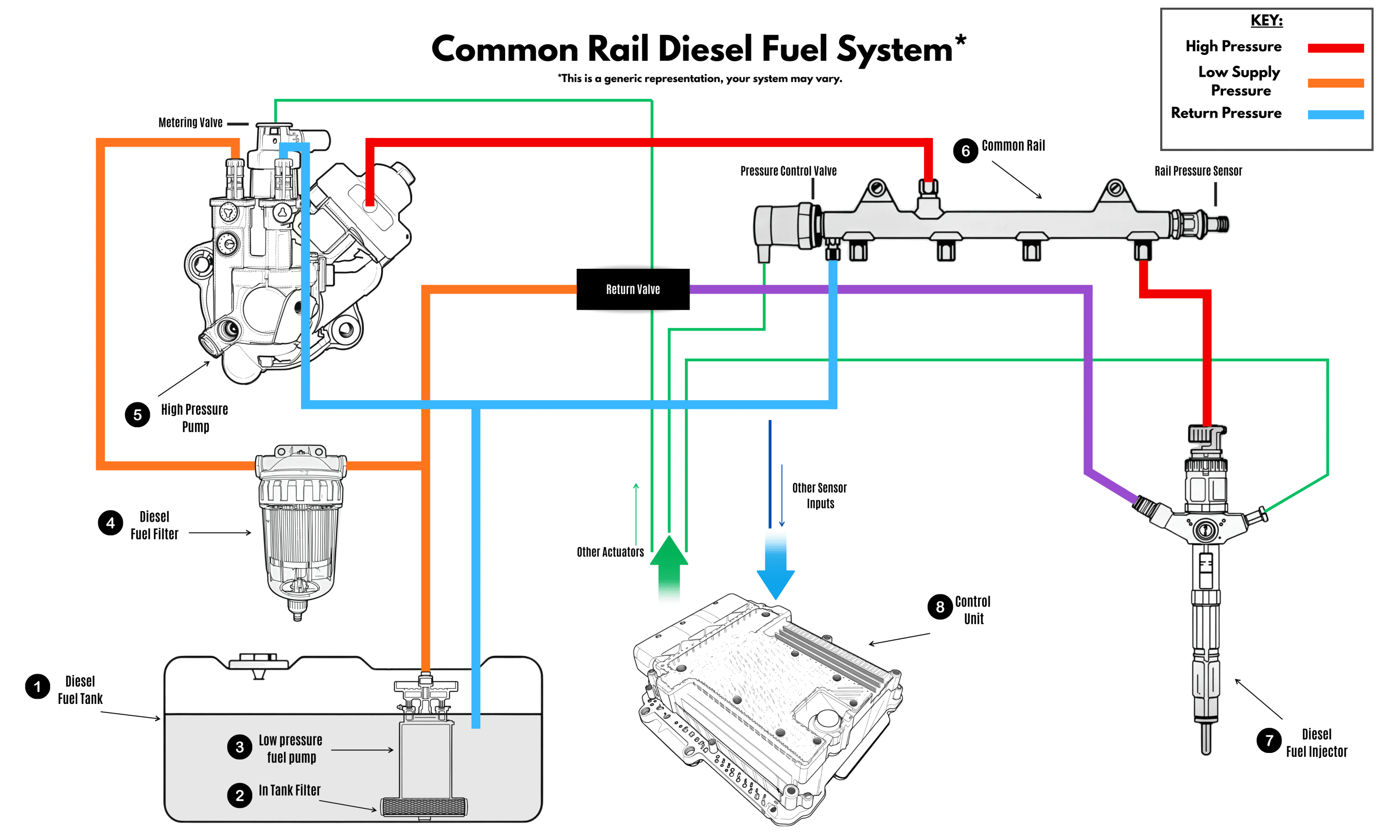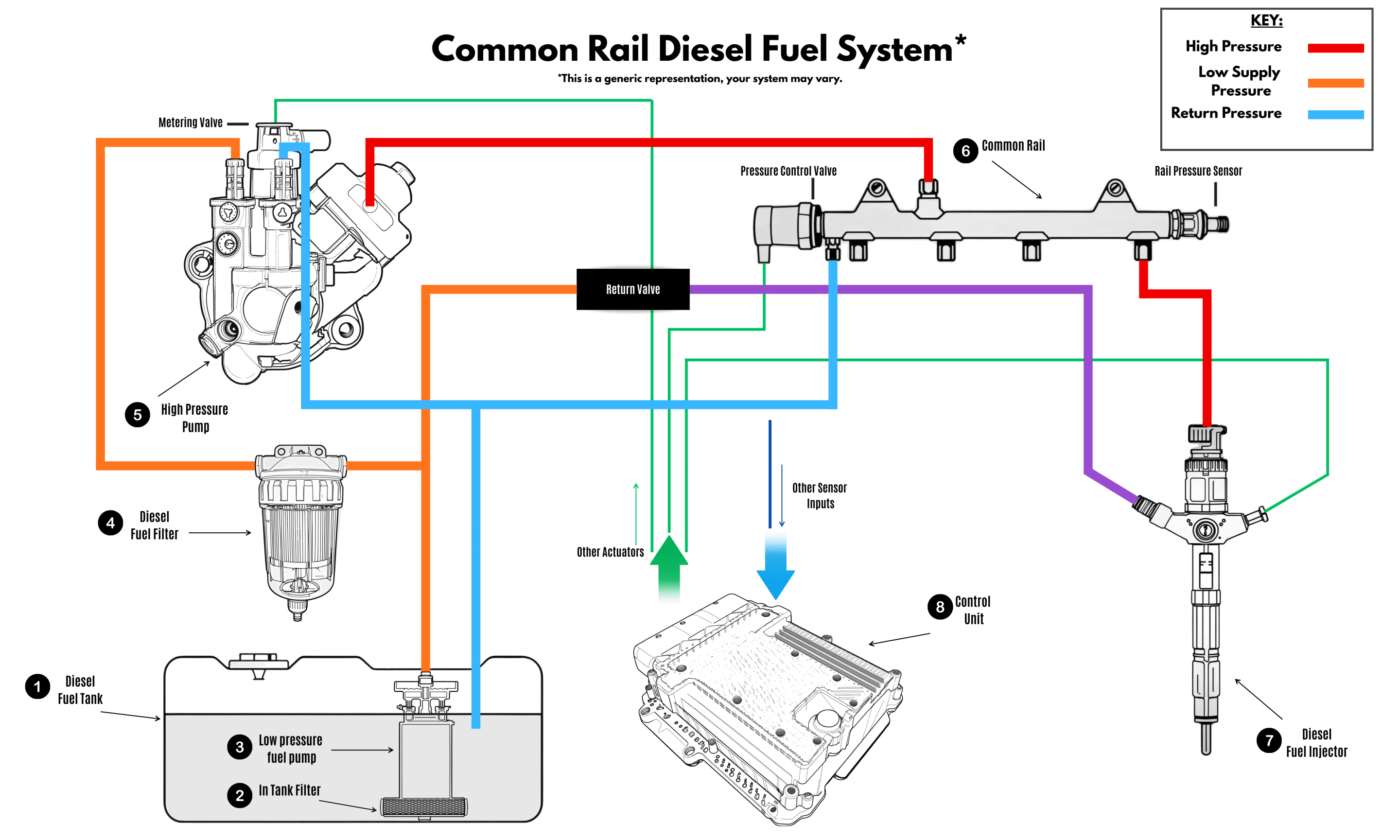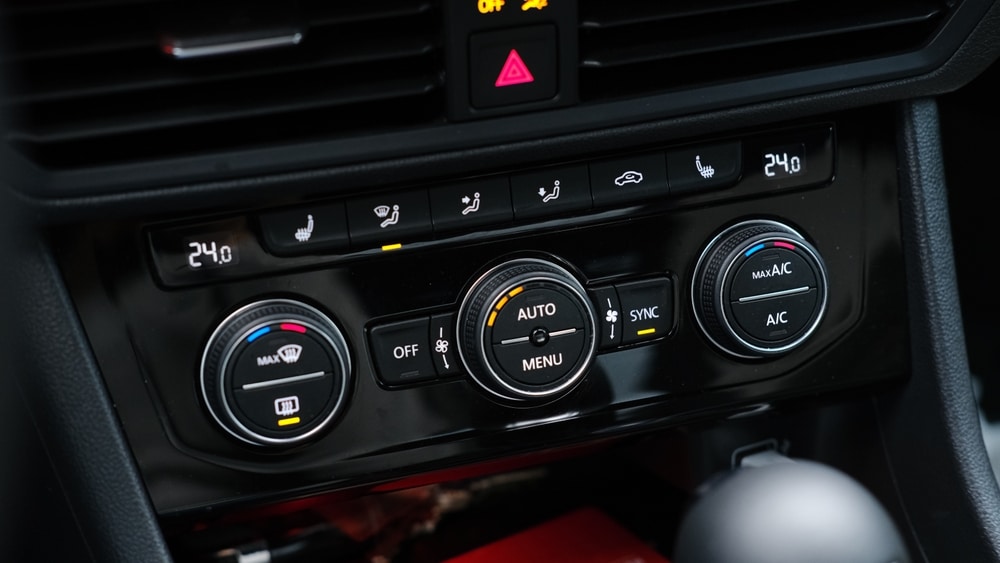Understanding Your Diesel Fuel System
The diesel fuel system plays one of the most critical roles in your vehicle: delivering fuel to the engine so combustion can take place. Without it, the engine simply wouldn’t run.
Today’s diesel systems are highly advanced. They manage fuel delivery with remarkable precision, giving modern vehicles the blend of power, efficiency, and reliability drivers expect.
However, as the diesel fuel system operates at extremely high pressures and with incredible accuracy, even a minor oversight, such as delaying a diesel fuel filter change or misfuelling, can cause significant and costly problems.
In this blog, we’ll explore how your diesel fuel system works, what can go wrong if it’s neglected, and why regular servicing at Fitch Autos in Brownhills helps prevent major repairs.
How the Diesel Fuel System Operates
There are several types of diesel fuel systems that cars use, but the majority of modern vehicles rely on what’s called a common rail diesel fuel system.
The basic idea is simple: a high-pressure rail feeds all injectors, ensuring accurate delivery and reliable combustion.
This setup works in two stages:
- Low-pressure stage: Fuel is drawn from the tank by the diesel fuel pump and passes through filters before reaching the high-pressure pump. This ensures a clean, stable supply at the correct pressure.
- High-pressure stage: The high-pressure pump compresses the fuel and stores it in the rail, which acts as a reservoir. From there, diesel injectors atomise the fuel into the cylinders as an ultra-fine mist at the precise moment it’s needed.
Put simply, the diesel fuel system ensures that clean, pressurised diesel reaches the engine’s cylinders consistently for efficient performance.
If you’d like advice on your own system, Fitch Autos in Brownhills can provide guidance as part of your service.
Inside the Diesel Fuel System Explained
With the big picture explained, it’s worth looking at the diesel fuel system in more detail. Every component contributes to the process, and working together, they ensure the engine runs smoothly.

A Closer Look at the Low-Pressure Side of the Diesel Fuel System
Fuel Tank & Low-Pressure Fuel Pump
The diesel fuel system starts at the tank (part 1 of image), where a low-pressure pump (part 3 of image) moves diesel towards the high-pressure pump (part 5 of image), ensuring a consistent flow into the system.
Diesel Fuel Filter
The diesel then passes through filters (parts 2 and 4 of image) which capture dirt and remove the water content found in diesel. This stage helps protect the fuel system from wear and corrosion.
A Closer Look at the High-Pressure System
High-Pressure Pump
Once cleaned, the fuel is drawn into the high-pressure pump (part 5 of image), which compresses diesel to the levels needed for injection (roughly 1800 Bar).
Metering and Pressure Control Valves
Two valves are critical here:
- Fuel metering valve: Determines how much fuel moves into the high-pressure stage.
- Pressure control valve: Regulates rail pressure so the system adapts to the engine’s needs.
Fuel Rail
The rail (part 6 of image) as a storage reservoir, keeping diesel pressurised and supplying each injector evenly.
Diesel Injectors
The process ends at the injectors (part 7 of image). With nozzle openings around the size of a human hair, they atomise fuel into a fine mist at the precise time for clean combustion.
The Distinct Features of the Diesel Fuel System
Your vehicle’s diesel fuel system may appear like a collection of pipes and pumps, but it’s a highly advanced piece of technology.
A few qualities make it stand out:
- Precision under pressure: The system manages both low-pressure supply and extreme high-pressure injection, delivering the exact amount of diesel in fractions of a second. Pressures reach thousands of times higher than tyre pressure, atomising the diesel to create a fine mist for efficient combustion.
- Engineered accuracy: Every stage, from pumping and filtering to the injectors, is designed to work with exact precision. This results in cleaner running, improved efficiency, and dependable performance.
- Contamination risk: Even a small amount of dirt or water can cause faults in a system that relies on such accuracy. Following the recommended servicing schedule and using quality diesel fuel helps reduce this risk.
If you keep on top of your vehicle’s maintenance, the diesel fuel system should operate smoothly in the background. But if you neglect it, small issues can quickly become significant and costly repairs.
What Happens If the Fuel System Is Ignored
Your diesel fuel system is designed to work with incredible precision, meaning neglect can lead to serious and costly issues, which is the last thing you want for your vehicle.
Some of the most common problems often include:
- Filter changes skipped: Diesel fuel filters help remove dirt and separate water, but if they aren’t replaced regularly, these contaminants can move through your system, corroding pumps and injectors.
- Low-grade diesel: Diesel that contains more water or debris accelerates wear in critical parts like the pump, rail, and injectors. This will often result in more repairs being needed.
- Repeat failures: Once contamination enters the system, it can cause multiple components to fail again and again until the source is resolved.
Compared with the high expense of a complete system repair, replacing a diesel fuel filter is a cost-effective preventative measure.
Another danger to be aware of is misfuelling. Accidentally putting petrol in a diesel system is extremely harmful, as it removes lubrication and can quickly damage pumps and injectors. Even starting the engine briefly may make things worse.
If misfuelling occurs, don’t start your car – arrange professional help straight away.
Looking After Your Diesel Fuel System
Your vehicle’s diesel fuel system is both powerful and precise. Regular maintenance will support smooth and efficient engine performance. But left without care, even minor oversights can escalate into costly problems, and that’s the last thing you want for your diesel vehicle.
You can reduce the risks by:
- Sticking to the manufacturer’s servicing schedule.
- Changing your diesel fuel filter on time.
- Using quality diesel to help protect against dirt and water contamination.
Preventive maintenance, such as service or filter replacement, is often far less costly than repairing a complete system failure later.
For expert care in Brownhills, Walsall, and the wider area, Fitch Autos is here to keep your diesel fuel system in top condition.
Why Drivers Choose Fitch Autos, Brownhills
Servicing your diesel fuel system is vital if you want it to perform at its best. Equally important is choosing the right garage to carry out the work. At Fitch Autos, we’ve built our reputation on dependable care and expertise.
Here’s what sets us apart:
- 12-month parts and labour guarantee on all work.
- Courtesy cars are available for your convenience.
- Trusted by drivers across Brownhills, Walsall, Cannock, and the surrounding areas.
We hold a {{average-rating}}⭐ Google rating from {{review-count}} happy customers, showing why local drivers continue to choose Fitch Autos.
📞 Call 01543 452630 to arrange your diesel service today.
FAQ – Diesel Fuel System Explained
1. What is a diesel fuel system’s role?
The diesel fuel system ensures that fuel is delivered from the tank to the engine so combustion can take place. It regulates both the pressure and timing of delivery, which is vital for performance. Without a working system, the engine simply wouldn’t run.
2. How does a common rail diesel fuel system operate?
The common rail diesel fuel system works in two stages. First, fuel is supplied at low pressure from the tank, moving through pumps and filters before reaching the high-pressure fuel pump. This pump then compresses the fuel to extreme levels and directs it into the common rail, which holds it under constant pressure. From there, the injectors atomise specific amounts of diesel into the cylinders at precisely the right time for combustion. This process allows for a consistent supply, efficient burning, and smoother performance.
3. Why should the diesel fuel system be serviced?
Servicing protects critical components, such as the diesel fuel pump, rail, and injectors, from dirt, water, and wear. Replacing the diesel fuel filter at the manufacturer’s recommended intervals helps prevent contamination, reduces the risk of breakdown, and avoids the high costs of repairing or replacing damaged parts.
4. What commonly causes failures?
The most frequent causes of diesel fuel system damage include skipped filter changes, misfuelling with petrol, using poor-quality diesel, or water contamination. Even the tiniest particles of dirt or droplets of water can circulate through the entire system, causing corrosion, accelerated wear, and damage to the high-pressure pump, fuel rail, and injectors.
5. What should you do if petrol is added by mistake?
Petrol lacks the lubrication properties of diesel. If it enters a diesel system, it can quickly harm the high-pressure pump, rail, and injectors. Even starting the engine for a fraction of a second may spread petrol through these components and increase the risk of severe damage. If misfuelling occurs, the safest response is not to start the vehicle and to call a professional immediately. The tank will need to be drained, the system flushed, and, depending on the situation, the diesel fuel filter and other parts may also need replacing to prevent long-term issues.
6. What do repairs cost?
The cost depends on the level of damage and the type of vehicle. A routine diesel fuel filter replacement is inexpensive and one of the most effective preventative measures. Ignoring it, however, can result in far more complex and costly repairs, particularly if the high-pressure fuel pump or injectors are affected.
Do you still have questions about your diesel fuel system? Call Fitch Autos in Brownhills on 01543 452630 for expert support or to book your service.
Call Now 01543 452630Save on Servicing



